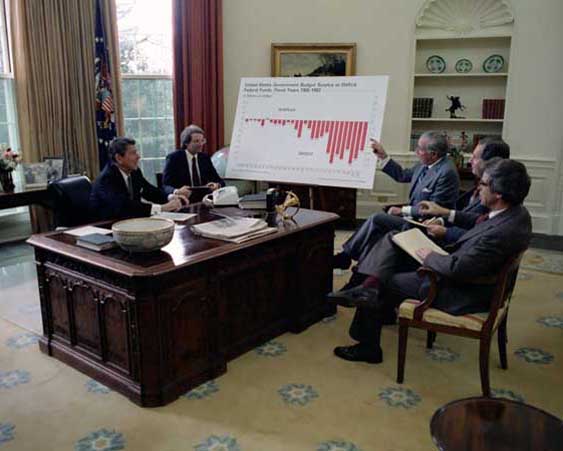Is there any hope at all for a 2011 common sense revolution on tax cuts?
Jun 16th, 2011 | By Counterweights Editors | Category: Key Current Issues
President Reagan with (l to r) David Stockman, Don Regan, Murray Weidenbaum, and Martin Anderson discuss the US economy in the Oval Office in 1981.
According to Martin Regg Cohn, in “Ontario’s political air war – the battle of the campaign ads … launched during the final game of the hockey season” last night, the Tim Hudak Conservatives’ mindless “anti-tax commercial” (part of “a wave of new commercials blasting [Ontario Premier Dalton] McGuinty as ‘The Tax Man’”) won first prize.
This strikes us as just yet another increasingly sad sign of our increasingly twisted times. And that’s not just because we agree with Mr. Cohn’s colleague Bob Hepburn, that “Dalton McGuinty is arguably the best Ontario premier in more than a quarter of a century.” (If you do the math here, btw, the argument is that the last Ontario premier as good as Mr. McGuinty was the authentic Progressive Conservative William Grenville Davis, 1971—1985.)
It is also because we agree with our own mysterious L. Frank Bunting, who back in February 2010 was quoting Ronald Reagan’s former budget director David Stockman with approval: “the lesson of the last 25 years is that it doesn’t work …Â Taxes are going to have to be raised. … The Republicans think their mission in life is to cut taxes. Sorry … game over. We’re now in the tax-raising business. And we’re going to be in the tax-raising business for the next decade”?
Mr. Stockman’s advice of course has as yet been falling on too many deaf ears – especially among his fellow Republicans in his own country. But it has been recently reiterated by the Canadian economist Thomas Courchene, in his 2011 essay “Rekindling the American Dream: A Northern Perspective.” Courchene writes: “It is hard to avoid the conclusion that the most important deficit currently facing the US is a revenue deficit. Overall government revenues in the US are about 27 percent of GDP, compared with 32 percent in Canada, 39 percent in the UK, 41 percent in Germany and 45 percent in France … The appropriate way to address this revenue deficit is with a tax on consumption.” (Hello … HST?)
Against the wisdom of such seasoned economic policy analysts, Mr. Hudak in Ontario, like Mr. Harper federally, and oh-so-many other politicians in oh-so-many regions of the global village today, continues to tell voters that we can continue to reduce taxes without compromising government services or, indeed, our broader public financial health. Yet as Mr. Stockman so plainly says, “the lesson of the last 25 years is that it doesn’t work.”
For all too many reasons that are all too easy to understand, the continuing electoral appeal of this palpably failed and discredited tax-cut rhetoric is such that even the likes of Premier McGuinty himself (or Premier Clark in BC, to say nothing of the provincial New Democrats in both provinces) feel unable or unwilling to speak up for the common sense truth. And it seems clear enough that no one (including President Obama in the USA today) has as yet figured out workable political solutions to the increasingly serious economic problems that lie at the bottom of this conundrum. But responsible journalism might at least occasionally point to what responsible public policy specialists like David Stockman and Thomas Courchene are saying. As Stockman has had the courage to so succinctly explain: “Sorry … game over. We’re now in the tax-raising business. And we’re going to be in the tax-raising business for the next decade.”


